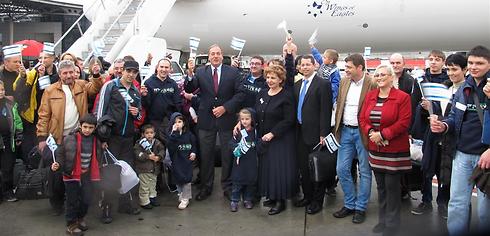
Why aliyah remains a critical global Jewish need
Op-ed: Immigration to Israel plays a key, strategic role in safeguarding and strengthening the Jewish state. Israel remains an incredible mosaic of world Jewry, thanks to aliyah.
Over the past year, more than 2,200 Jews from France, Moldova, Turkey, Ukraine, Uruguay, Venezuela and other nations have arrived in Israel - and more from France and Ukraine are due this week - on what we call Freedom Flights through our organization, The International Fellowship of Christians and Jews (Keren L’Yedidut), all thanks to the incredible generosity of tens of thousands of Christian supporters of Israel.
These Christians across North America recognize something basic about the Jewish state: Aliyah has been, and must remain, the raison d’etre for the Jewish state and the Zionist ideal – the ingathering of the Diaspora.
Historically, Israel provided a safe haven for Jewish refugees fleeing economic distress, persecution and violence. The modern state, with all of its complexities and imperfections, still allowed the Jewish people to help create the contemporary narrative of rebuilding our ancient homeland.

But as Israel has morphed into the "Start-Up Nation,” the centrality and priority of aliyah has diminished, to the point where the Jewish Agency for Israel – our government’s aliyah arm – shifted its strategic focus to global Jewish identity.
Why? Because of a mistaken notion that that the peaks of aliyah are behind us, that Jews around the world are largely secure or no longer inspired to make Israel their home. But the reality is that Jews from France to Ukraine remain threatened, either due to a virulent resurgence in anti-Semitism, to dire economic problems and even to sheer assimilation. The fact is, aliyah remains a critical global Jewish need - and we must rise to the challenge.
In fact we are – and that’s why the nature of aliyah is shifting. Even as the Jewish Agency de-emphasized aliyah, The Fellowship and others like Nefesh B’Nefesh (which we helped found a decade ago with a $2 million seed gift) are increasingly stepping into the aliyah breach. This past year, for example, more than 6,500 olim came to Israel with privately-funded, independent organizations like ours.
We intend to drive the trend forward in 2016, doubling the number of olim we bring to Israel on Freedom Flights to at least 4,000. For the coming calendar year, we will continue working in France, Moldova, Uruguay, Venezuela and elsewhere including the Spanish North African city of Mellila, Turkey, and an Arab country whose name we cannot divulge.
Yet our mission does not end when our Freedom Flights land at Ben-Gurion Airport. We believe that many olim also require far more efficient klita services than they receive today, in order to better assimilate into Israeli life. Olim want to know: Will I have a decent job? Will I find affordable housing? Will my family make the cultural adjustment?
We aim to answer those questions by working with olim in their countries of origin, tailoring the klita services to their unique needs.
The Fellowship, for examples, provides information fairs and preparatory seminars in Diaspora countries, guidance for six months once the immigrants arrive in Israel, employment counseling, one-time financial aid or six months of rental support, tuition assistance for job training, financial support to help immigrants learn Hebrew, material aid such as furniture, appliances and medical treatment, and private tutors and informal education for children.
We need to both streamline the bureaucratic klita process, and create a more user-friendly, hands-on and personalized approach. For example, French Jews are particularly concerned about housing, while Ukraine Jews are more focused on financial issues. In launching our aliyah and klita department recently, The Fellowship has proven, that if you help potential olim by providing them with a secure safety net here in Israel, then Israel’s annual aliyah numbers will increase significantly.
We need to also remember that aliyah not only remains a lifeline for the Diaspora, it plays a key, strategic role in safeguarding and strengthening the Jewish state. Over the decades, Israel’s olim have enriched Israel’s economic, cultural, democratic and technological edge. Israel remains an incredible mosaic of world Jewry, thanks to aliyah.
We will recommit ourselves to aliyah in 2016, and we – The Fellowship and our generous supporters - will help Israel go from strength to strength.
Rabbi Yechiel Eckstein is president and founder of the International Fellowship of Christians and Jews (The Fellowship).










